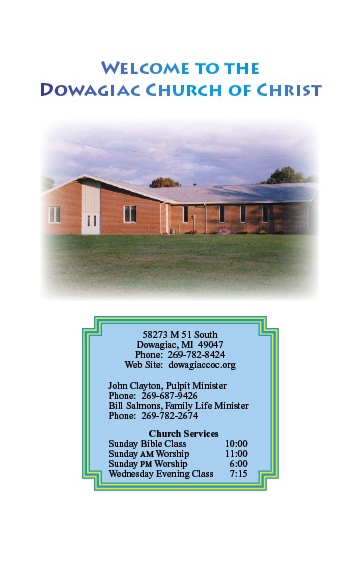Home Worship Services Sermons and Classes Location Contacts Bulletins Links |
FAMILY NEWSTHANKS: Our thanks to everyone who participated in the highway clean up yesterday. It is important to let the community know we are here to serve, and being a part of making Dowagiac a good place to live and an attractive place to drive through is part of that. NEW CLASS: We have had several suggestions on the subject of what we should study on Wednesday night. Some of those suggestions will be worked into sermons that are given on Sunday morning, the first being this morning. Several wanted to have a class on Psalms, and we will start a study of Bible literature and the Psalms starting this coming Wednesday night. Do you know: (1) the origin of the Psalms? (2) The five books they come from? (3) That David did not write all the Psalms, and (4) that even Moses wrote one of them? There is a lot to learn on this subject, so come and learn with us. GET A PRAYER SHEET: Remember to get and use the prayer sheet listing people who need prayers, cards, and calls. See Julie or Karl who work hard to keep it up to date. TODAY'S LESSON
INTRODUCTION — Definitions:
A. Type — An Old Testament story that has a message.
EGYPT IS A TYPE OF THE WORLD IN WHICH WE LIVE.
B. Anti-type — A New Testament teaching based on it. A. EXODUS 1:6-14
MOSES IS A TYPE OF CHRIST.
1. Pharaoh is a type of Satan.
B. God's people are forced to work in miserable conditions.
2. Uses infanticide to remove undesirables (verses 16, 22). 3. Satan is in control of this world's people. 4. Abortion, euthanasia is part of our world. 1. Exodus 2:23 – 24
C. God knows what we are up against.2. Working in a world of sin is miserable. A. Acts 3:22 – 23 — from Deuteronomy 18:15 –19
THE PASCHAL LAMB IS ATYPE OF CHRIST
B. Comparisons of Moses and Christ 1. Both were to be killed as infants.
C. Do we listen to Christ today?2. The people would not listen to either. a. Exodus 6:9 and John 6:66
A. 1 Corinthians 5:7; 1 Peter 1:19
CROSSING OF RED SEA IS A TYPE OF BAPTISM.
B. Exodus 12:21– 23 C. Physical death and spiritual death pass over us. A. Exodus 14:21– 22 and 29 – 30
WANDERINGS IN WILDERNESS ARE A TYPE OF OUR LIVES.
1. Note the Israelites had to decide whether to go.
B. 1 Corinthians 10:1– 4C. Notice what saved Israel. 1. Not the water — their obedience
2. 1 Peter 3:21 A. 1 Corinthians 10:5 –13 — Baptism is a start, not an end. B. Exodus 34:9, 11 C. Will you learn from Egypt? THE BACK PAGEWe Take The Easy PartsSomeone has said that the government has ruined our economy because for years they have taken easy sounding parts out of two contradictory theories of government and combined them. That may not be a perfect explanation of our economic mess, but it sounds like a good explanation of the spiritual, and moral mess we are in. Christianity (I mean biblical Christianity, not the artificial modern substitute) calls on us to die to our old life, to die to sin and to live by new standards (Romans 6:1– 6, for example). We do not change our ways in order to gain salvation, we change our ways out of thankfulness for salvation already gained (Ephesians 2:8 – 10), BUT WE DO CHANGE OUR WAYS. That is the teaching of scripture. We like part of that teaching. The part about how we are saved not by what we do but by what Christ did sounds good. We like that. We will keep that. But we do not like the part about how, in thankfulness for his great mercy, we must allow him to transform our lives. That sounds hard. We ignore that part. We call ourselves Christians because we cling to a part of Christianity, salvation by grace. But we reject another part of Christianity, the call to live a new life. Flour is a fundamental ingredient in cake, but flour does not a cake make. God's grace is the fundamental of Christianity. His gracious love is what creates not only our salvation but even the possibility of our loving him in return. Christianity begins with God's grace and ends in God's glory. He, not we, is fundamental to Christianity. But we are supposed to respond in submission. Our lives are supposed to change. We do not create the change, but neither are we to resist the transformation he intends for our lives. Do we really embrace God's grace? Do we really believe that he, in the person of Jesus, died for us? Does that belief demonstrate itself in a transformed life? Or are we just taking a part of Christianity and calling that part the whole? — Thayer Salisbury, Toledo, Ohio |
